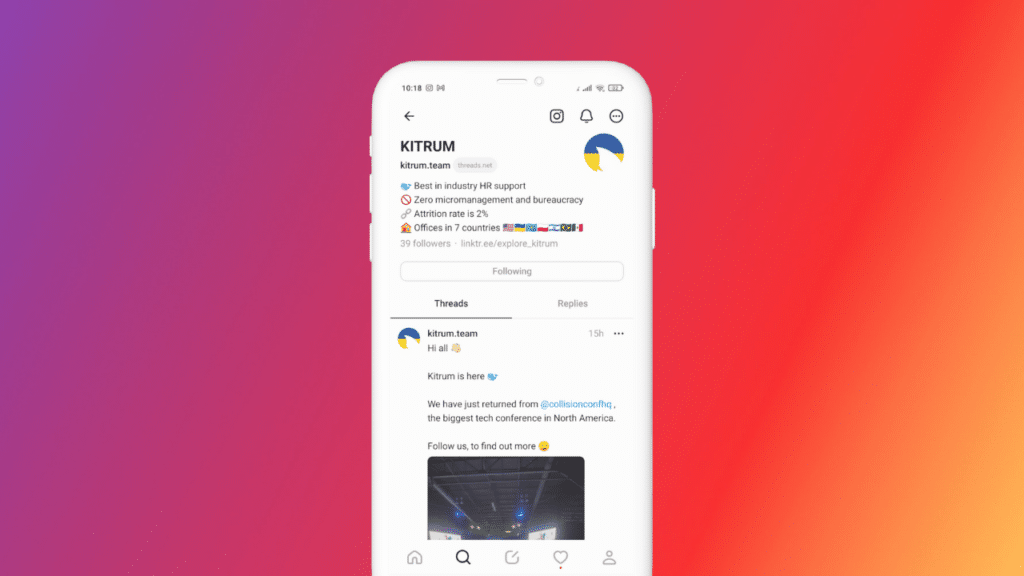Business & Tech News: Meta Launches a Game-Changing Twitter Competitor
Introducing you to our business and tech news, where we’ll bring you the latest updates in the world of apps, AI, startups, security, and venture. From Meta introduced a new app called Threads to the latest list of June massive layoffs in tech companies. Join us as we delve into noteworthy current news roundup.
Apps
Meta launches Threads: is it a game-changing Twitter competitor?
Threads is a new app developed by Meta, the parent company of Facebook, Instagram, and WhatsApp. The app resembles Twitter with its text-based feed, but users can also share photos and videos for real-time conversations. Meta aims to create a friendly public space for conversation, emphasizing text, ideas, and discussing thoughts.
According to Mark Zuckerberg, within just the first day of the app’s release, the Threads drew a staggering 30 million users, demonstrating a remarkable level of interest and adoption among the user base. Kitrum also didn’t miss the chance to create Kitrum´s account on Threads and be one of the first to join the vibrant community.

“I think there should be a public conversations app with 1 billion+ people on it. Twitter has had the opportunity to do this but hasn’t nailed it. Hopefully, we will.” says Mark Zuckerberg in his Threads post.
What are some interesting facts about the Threads?
- Messages in Threads are limited to 500 characters, and users can reply, repost, and quote others’ posts;
- Thread accounts can be set as public or private, and verified Instagram accounts are automatically verified on Threads;
- The app combines Instagram’s aesthetics and navigation, allowing seamless sharing of posts to Instagram Stories;
- Currently, it is impossible to remove your Threads profile without deleting your Instagram account;
- Threads can now be downloaded in more than 100 countries, including the United Kingdom. However, it´s not yet available in the European Union due to regulatory considerations and concerns.
Have you had a chance to create an account on Threads yet?
Meta is eager to provide transparency about its AI recommendation algorithms
Meta is taking steps to enhance transparency and user control over its AI recommendation algorithms. The company publishes new materials explaining how the Meta recommendation engine works across different products. Besides, Meta is introducing the “Why am I seeing this?” option for Instagram, Facebook Reels, and Instagram’s Explore page, allowing users to understand the basis for the content appearing in their feeds. By the way, you can learn more about how a recommendation engine can boost your sales in our previous article.
Nick Clegg, Meta’s president of Global Affairs, expressed the company’s commitment to transparency and user empowerment regarding AI systems. Meta is testing a feature on Instagram that allows users to mark posts as “Interested” to receive more similar content. It is also working on making the “Show more, Show less” controls on Facebook more prominent.
Meanwhile, Meta has discussed the possibility of developing AI models with trillions of parameters, which raises concerns about user control over content recommendations. Meta invites researchers to study its algorithms through a new Content Library and API. Meta’s efforts to clarify its algorithms come in response to scrutiny and concerns about the impact of its recommendation systems. The company aims to address criticisms and appease regulators and privacy advocates before expanding AI-powered content.
Meta is introducing fresh parental control features for Instagram and Messenger
Meta has unveiled new parental control tools for Instagram, Facebook, and Messenger. These tools include a parental supervision hub in Messenger, blocking unwanted DMs, and reminders for teens to take breaks. The Messenger supervision controls allow guardians to monitor privacy and safety settings, changes in the contact list, and usage time. Parents can also manage who can message their teens and view their stories. Instagram has implemented measures to limit teen interaction with unknown adults, including sending text-only invitations for permission to interact.

Meta also introduces controls such as the “Quiet mode” feature to reduce prolonged usage and encourage breaks.The company will notify users to take breaks and encourage teens to close the app when watching Reels at night. Parents can now supervise their teens’ Instagram accounts and view the accounts they follow. Meta has been implementing various measures for teen safety, including ad-targeting controls and tools to prevent the posting of intimate images.
Amazon Launches AWS AppFabric for SaaS Application Connections
Amazon has launched AWS AppFabric, a new service designed to help organizations connect and manage their software-as-a-service (SaaS) applications more efficiently. With AppFabric, users can integrate their third-party apps through the AWS console, enabling a unified view of app usage and performance.
The service provides standardized data and cross-app workflows, leveraging AWS’ Open Cybersecurity Schema Framework for data analysis and threat detection. AppFabric also allows users to set standard policies across apps and monitor them for unusual activity. This offering addresses the challenges of managing the growing number of SaaS apps within enterprises, as studies indicate that organizations use an average of 130 apps.
By offering streamlined integration and management capabilities, AppFabric aims to simplify the process and reduce duplicate work caused by multiple SaaS applications. Furthermore, Amazon plans to introduce an AI assistant powered by its Bedrock generative AI platform, enabling contextual insights and content creation across connected SaaS apps.
AI
Microsoft introduces advanced AI-driven shopping features for Bing and Edge
Microsoft has recently introduced innovative AI-powered shopping features for its Bing search engine and Bing AI chatbot in the Edge sidebar. These tools are designed to improve the shopping experience by automatically generating buying guides, aggregating products, facilitating comparisons between similar items, and providing information on where to make purchases. Microsoft will also earn affiliate fees when users buy products through these tools. Initially launched in the United States, the buying guides will soon be available worldwide through the Edge browser.
Moreover, Microsoft has introduced AI-generated review summaries, enabling users to obtain concise overviews of online product reviews. By simply asking Bing Chat in Edge, individuals can quickly gather insights into what people are saying about a particular product.
To further assist consumers, Microsoft has introduced a tool called Price Match. With this feature, users can request a price match from retailers even after a price drop occurs. Microsoft has partnered with several U.S. retailers with price match policies and intends to collaborate with more in the future.

OpenAI Improves ChatGPT with Web Search (Bing-based)
OpenAI has introduced a new feature called Browsing to its ChatGPT app, allowing subscribers to use Bing for web searches. This feature is available on both iOS and Android app versions and is especially useful for queries related to current events and information beyond ChatGPT’s training data. However, limiting the search capabilities to Bing has raised concerns about user options and potential biases. Despite the partnership between OpenAI and Microsoft, some users may desire alternative search engine options. ChatGPT also allows users to directly access search results within the conversation in a separate update.
Interested in AI solutions?
OpenAI Forms Team for Responsible Governance of ‘Superintelligent’ AI
OpenAI is forming a Superalignment team led by Ilya Sutskever and Jan Leike to address the challenges of controlling “superintelligent” AI systems. They acknowledge that current methods relying on human supervision will not be effective when dealing with AI systems that are more intelligent than humans. The team will use 20% of OpenAI’s computing resources to develop automated alignment researchers and train AI systems to evaluate and improve alignment techniques. OpenAI believes that AI can make faster progress in alignment research. While there are limitations and potential risks involved, OpenAI is committed to sharing its findings and contributing to the alignment and safety of AI systems beyond its own.
¨Superintelligence will be the most impactful technology humanity has ever invented and could help us solve many of the world’s most important problems. But the vast power of superintelligence could also be very dangerous and could lead to the disempowerment of humanity or even human extinction.¨ — say Jan Leike and Ilya Sutskever in their blog.
Databricks acquires MosaicML, a rival of OpenAI, in a deal worth $1.3 billion
Databricks is acquiring MosaicML, an open-source startup specializing in neural networks and generative AI tools, for $1.3 billion. MosaicML’s expertise will be integrated into Databricks’ Lakehouse Platform, enhancing its AI offerings. This move reflects the high demand for AI talent and technology. The acquisition enables Databricks to capitalize on the growing interest in generative AI, while strengthening its position in the market. MosaicML’s focus on enabling organizations to build their language models using their data sets it apart. The MosaicML team will join Databricks, with CEO Naveen Rao remaining. This acquisition signifies the ongoing trend of mergers and acquisitions in the AI industry.
Security

The number of victims impacted by the widespread hacking of MOVEit continues to rise
Hackers have exploited a security vulnerability in the MOVEit file transfer tool, compromising the personal data of over 15.5 million individuals. The number of affected organizations continues to grow, with more than 140 known victims targeted by Clop ransomware attacks. The victims include various entities such as state residents, insurance providers, retirement systems, and universities.
The U.S. Department of Health and Human Services and the Department of Energy are among the government agencies impacted. Clop has added numerous new victims to its leak site, including banks, consultancy firms, legal companies, and energy giants. The exact number of affected organizations and individuals remains uncertain as more victims are expected to be revealed. The U.S. State Department has offered a $10 million reward for information on the Clop ransomware group.
Venture
List of fresh June tech layoffs
Niantic, Plex, Grab, Olx Group, Mojocare, Tada, Better.com, Ursa Major, and Spotify are prominent tech companies that have recently announced layoffs in June. Here is a rundown of the latest outcomes:
- Niantic: On June 29, Niantic revealed that it laid off 230 employees, marking a second round of layoffs within a year.
- Plex: Also, on June 29, Plex announced a significant workforce reduction of approximately 20%, resulting in the layoff of 37 employees.
- Grab: During the week of June 23, Grab, a ride-sharing company, laid off over a thousand employees, constituting around 11% of its workforce.
- Olx Group: On June 20, Olx Group eliminated around 800 jobs worldwide, particularly in its automotive business, Olx Autos.
- Mojocare: Mojocare, a company in the healthcare sector, announced on June 18 that it would be laying off the majority of its workforce, amounting to approximately 150 employees.
- Tada: Tada, a subsidiary of Korean ride-sharing company Socar, disclosed on June 15 its plan to let go of at least 45 employees, equivalent to 50% of its staff.
- Better.com: On June 7, Better.com, a real estate company, implemented layoffs within its real estate team, although the exact number of affected employees remains undisclosed.
- Ursa Major: The rocket engine startup Ursa Major confirmed layoffs of at least 14 employees on June 7, declining to disclose further details about the extent of the workforce reduction.
- Spotify: In a move affecting its podcast unit, Spotify announced on June 5 that it would be cutting 200 jobs, resulting in a 2% reduction of its overall workforce. This follows a previous round of layoffs earlier this year.









